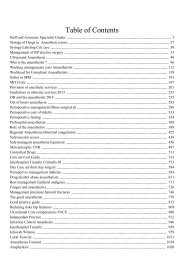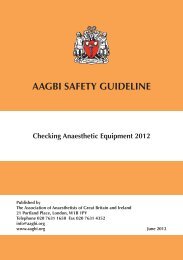pdfjoiner
You also want an ePaper? Increase the reach of your titles
YUMPU automatically turns print PDFs into web optimized ePapers that Google loves.
Management of hypertension before elective surgery guidelines Anaesthesia 2016, 71, 326–337<br />
Recommendations<br />
•<br />
General practitioners should refer patients for elective<br />
surgery with mean blood pressures in primary<br />
care in the past 12 months less than 160 mmHg<br />
systolic and less than 100 mmHg diastolic.<br />
• Secondary care should accept referrals that document<br />
blood pressures below 160 mmHg systolic and<br />
below 100 mmHg diastolic in the past 12 months.<br />
• Pre-operative assessment clinics need not measure<br />
the blood pressure of patients being prepared for<br />
elective surgery whose systolic and diastolic blood<br />
pressures are documented below 160/100 mmHg in<br />
the referral letter from primary care.<br />
• General practitioners should refer hypertensive<br />
patients for elective surgery after the blood pressure<br />
readings are less than 160 mmHg systolic and less<br />
than 100 mmHg diastolic. Patients may be referred<br />
for elective surgery if they remain hypertensive<br />
despite optimal antihypertensive treatment or if<br />
they decline antihypertensive treatment.<br />
• Surgeons should ask general practitioners to supply<br />
primary care blood pressure readings from the last<br />
12 months if they are undocumented in the referral<br />
letter.<br />
• Pre-operative assessment staff should measure the<br />
blood pressure of patients who attend clinic without<br />
evidence of blood pressures less than<br />
160 mmHg systolic and 100 mmHg diastolic being<br />
documented by primary care in the preceding<br />
12 months. (We detail the recommended method<br />
for measuring non-invasive blood pressure accurately,<br />
although the diagnosis of hypertension is<br />
made in primary care.)<br />
• Elective surgery should proceed for patients who<br />
attend the pre-operative assessment clinic without<br />
documentation of normotension in primary care if<br />
their blood pressure is less than 180 mmHg systolic<br />
and 110 mmHg diastolic when measured in clinic.<br />
The disparity between the blood pressure thresholds<br />
for primary care (160/100 mmHg) and secondary<br />
care (180/110 mmHg) allows for a number of factors.<br />
Blood pressure reduction in primary care is based on<br />
good evidence that the rates of cardiovascular morbidity,<br />
in particular stroke, are reduced over years and<br />
decades. There is no evidence that peri-operative blood<br />
pressure reduction affects rates of cardiovascular events<br />
beyond that expected in a month in primary care.<br />
Blood pressure measurements might be more accurate<br />
in primary care than secondary care, due to a less<br />
stressful environment and a more practised technique.<br />
What other guideline statements are available on<br />
this topic?<br />
There is detailed evidence-based guidance on the diagnosis<br />
and treatment of hypertension in the community<br />
from, for example, the National Institute for Health<br />
and Care Excellence [1]. There is little guidance on a<br />
‘safe’ blood pressure for planned anaesthesia and surgery.<br />
Why was this guideline developed?<br />
There is no national guideline for the measurement,<br />
diagnosis or management of raised blood pressure<br />
before planned surgery. There is little evidence that<br />
raised pre-operative blood pressure affects postoperative<br />
outcomes. Local guidelines vary from area to area.<br />
Hypertension is a common reason to cancel or postpone<br />
surgery. In our sprint audit, 1–3% of elective<br />
patients had further investigations precipitated by<br />
blood pressure measurement, of whom half had their<br />
surgery postponed. Across the UK this would equate<br />
to ~100 concerned and inconvenienced patients each<br />
day, with associated costs to the NHS and the national<br />
economy [2, 3].<br />
This guideline is the first collaboration between<br />
the AAGBI and the British Hypertension Society; these<br />
two organisations have very different perspectives.<br />
Members of the British Hypertension Society are concerned<br />
with the long-term reduction in rates of cardiovascular<br />
disease, particularly strokes. Anaesthetists are<br />
more focused on immediate complications, in the perioperative<br />
period. This guideline aims to prevent the<br />
diagnosis of hypertension being the reason that<br />
planned surgery is cancelled or delayed. As such, it<br />
should also be of interest to hospital managers and<br />
commissioners of hospital care.<br />
How does this statement differ from existing<br />
guidelines?<br />
This guideline serves, therefore, not to advise on treatment<br />
of hypertension, but rather to produce a com-<br />
© 2016 The Authors. Anaesthesia published by John Wiley & Sons Ltd on behalf of Association of Anaesthetists of Great Britain and Ireland. 327





